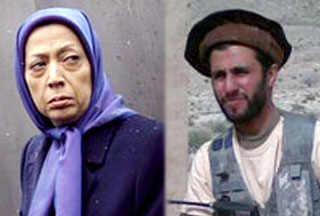Terrorist Cell Member: MKO, Jundollah Having Tight Cooperation
An apprehended member of the Jundollah terrorist group confessed that the anti-Iran terrorist Mojahedin-e Khalq Organization (MKO) and his group have established organized cooperation to wage stronger and more frequent terrorist attacks against Iran.
"A member of the Jundollah grouplet has very recently declared after his arrest that the group has established organized ties with the MKO," the Persian-language website, Jahan, reported on Tuesday.
The terrorist also confessed that a number of MKO members in Pakistan pledged to work with Jundollah in a bid to provide the group with intelligence and communications backup and assistance for suicide attacks and sabotage operations inside Iran, the report added.
According to the Persian website, the MKO and Jundollah terrorist groups have agreed to stage suicide attacks on gatherings, meetings and conventions affiliated to the Islamic Republic.
After Iran’s security forces arrested Jundollah’s No 1 and 2 and its other high-ranking and influential leaders in the last few months, an increasing number of Jundollah members have started surrendering themselves to the Iranian authorities.
The Pakistani based Jundollah terrorist group, directly sponsored and supported by Washington, is responsible for several terrorist operations which have killed tens of citizens, officials and security forces in southeastern Iran.
Abdolmalek Rigi, the ringleader of the terrorist group, confessed after his arrest in late February that his group was assisted and supported by the US and disclosed that he was on route to Bishkek to meet a high-ranking US official at a nearby military base when he was arrested by Iranian security forces.
Rigi also said that he and the US official were going to discuss new terrorist attacks on Iranian territory.
Rigi on June 2 admitted receiving assistance from the MKO, but relations between the two anti-Iran terrorist groups had surfaced a long time ago when US started plans to coordinate anti-Islamic Republic moves.
In August 2009, the Jundollah terrorist group warned the Baghdad government that it would retaliate against the closure of a main camp of MKO by the Iraqi forces.
"…the Iraqi government should know that its hostile measures against the residents of Camp Ashraf who are Iranian immigrants in this city are not and will not be in the interest of the Iraqi government," Jundollah warned in a statement issued in Iraq last August.
The MKO, whose main stronghold is in Iraq, has been in the country’s Diyala province since the 1980s.
Six years after toppling Saddam Hussein’s government in 2003, the country’s security forces took control of the training base of the MKO at Camp Ashraf – about 60km (37 miles) north of Baghdad and changed the name of the military center from Camp Ashraf to the Camp of New Iraq.
The Iraqi government and parliament have both voiced strong determination for expelling the group from the country.
The MKO started assassination of the citizens and officials after the revolution in a bid to take control of the newly established Islamic Republic. It killed several of Iran’s new leaders in the early years after the revolution, including the then President, Mohammad Ali Rajayee, Prime Minister, Mohammad Javad Bahonar and the Judiciary Chief, Mohammad Hossein Beheshti who were killed in bomb attacks by MKO members in 1981.
The MKO is behind a slew of assassinations and bombings inside Iran, a number of EU parliamentarians said in a recent letter in which they slammed a British court decision to remove the MKO from the British terror list. The EU officials also added that the group has no public support within Iran because of their role in helping Saddam Hussein in the Iraqi imposed war on Iran (1980-1988).
Many of the MKO members abandoned the terrorist organization while most of those still remaining in the camp are said to be willing to quit but are under pressure and torture not to do so.
A May 2005 Human Rights Watch report accused the MKO of running prison camps in Iraq and committing human rights violations.
According to the Human Rights Watch report, the outlawed group puts defectors under torture and jail terms.
The group fled to Iraq in 1986, where it was protected by Saddam Hussein and where it helped the Iraqi dictator suppress Shiite and Kurd uprisings in the country.
The terrorist group joined Saddam’s army during the Iraqi imposed war on Iran (1980-1988) and helped Saddam and killed thousands of Iranian civilians and soldiers during the US-backed Iraqi imposed war on Iran.
Since the 2003 US invasion of Iraq, the group, which now adheres to a pro-free-market philosophy, has been strongly backed by neo-conservatives in the United States, who argue for the MKO to be taken off the US terror list.

